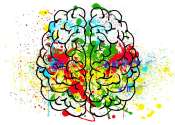Last update:
Neuroscience news
Diseases, Conditions, Syndromes
Study highlights underrecognized link between kidney disease and cognitive decline
A new study published in the American Journal of Physiology—Heart and Circulatory Physiology reveals that chronic kidney disease (CKD) accelerates cognitive decline through interconnected damage to the heart and brain—and ...
1 hour ago
0
0
Genetics
Comprehensive map reveals neuronal dendrites in the mouse brain in greater detail
Understanding the shape or morphology of neurons and mapping the tree-like branches via which they receive signals from other cells (i.e., dendrites) is a long-standing objective of neuroscience research. Ultimately, this ...
22 hours ago
0
45
Single enzyme failure found to drive neuron loss in dementia
Researchers at Helmholtz Munich, the Technical University of Munich and the LMU University Hospital Munich uncovered a mechanism that protects nerve cells from premature cell death, known as ferroptosis. The study provides ...
18 hours ago
0
34

When anger hurts: How feeling wronged can intensify chronic pain
We all know stress can worsen pain, but new research shows that anger and a sense of injustice may be even more powerful triggers.
17 hours ago
0
0

Breathe in, breathe out: How respiration shapes remembering
First and foremost, we breathe in order to absorb oxygen—but this vital rhythm could also have other functions. Over the past few years, a range of studies have shown that respiration influences neural processes, including ...
18 hours ago
0
13

Skin-to-brain signal explains why warm hugs make us feel so good about ourselves
As winter closes in, you might start to notice your fingers and toes freezing when you go outside, or your face flushing hot when you go into a heated building. In these moments of changing temperature, we become more aware ...
18 hours ago
0
19

Brain enzyme that drives nicotine addiction and smoking dependence identified
Nicotine addiction remains one of the most persistent public health challenges worldwide, driven by changes in the brain that reinforce repeated use and make quitting extremely difficult. For decades, scientists have focused ...
20 hours ago
0
41

How the brain prioritizes bodily signals in conscious awareness
A new study shows that visual and tactile impressions that are related to our own body are prioritized for reaching conscious awareness. This helps us understand how we develop the feeling that the body is our own—through ...
18 hours ago
0
2

Visualizing neural connections in 3D with a new microscopy technique
Leiden researchers can now visualize the connections between brain cells. Their microscopy technique could significantly advance the human quest to understand brain functions. The study is published in the Proceedings of ...
18 hours ago
0
0

Microglia replacement paves way for neurodegenerative disease therapies, moving from mice to humans in just 5 years
Tiny immune cells called microglia protect the central nervous system (CNS) in a multitude of ways: They provide innate immunity, shape neurodevelopment, maintain homeostasis and modulate neurological disorders. That functionality ...
18 hours ago
0
0

AI method recovers missing movement data to enhance behavioral analysis
Scientists learn about the brain's inner workings by studying what animals or people do, how they move, react, and make choices. Behavior is complex, as animals and humans can move in countless different manners. Yet, neuroscience ...
11 hours ago
0
0

Recent trial reveals promising therapy for aggressive brain cancer
Huntsman Cancer Institute at the University of Utah (the U) participated in a clinical trial that found that a new combination treatment plan helped people with recurring grade 3 astrocytoma, an aggressive form of brain cancer, ...
12 hours ago
0
0

Rebuilding the mind after cancer: Study shows remote program could help
For many adults recovering from cancer, finishing treatment does not mean the end of challenges. Up to 80% of survivors continue to struggle with "chemobrain"—subtle but disruptive changes in memory, attention, and mental ...
17 hours ago
0
0

Marriage and emotional support may protect against obesity through brain–gut connection
Strong social relationships, particularly high-quality marriages, may help protect against obesity by influencing a complex communication system between the brain and gut, according to new research by UCLA Health.
Dec 4, 2025
0
0

'Brainquake' phenomenon links psychotic states to chaotic information flow
Some psychiatric disorders, particularly schizophrenia and bipolar disorder (BP), can prompt the emergence of so-called psychotic states, mental states characterized by distorted thinking patterns, altered perceptions and ...

Molecular switch links early-life stimulation to lasting memory changes
Researchers have identified a molecular mechanism that helps explain why growing up in a stimulating environment enhances memory. In contrast, a lack of stimulation can impair it. The team from the Institute for Neurosciences ...
Dec 3, 2025
0
22

New bioadhesive strategy can prevent fibrous encapsulation around device implants on peripheral nerves
Peripheral nerves—the network connecting the brain, spinal cord, and central nervous system to the rest of the body—transmit sensory information, control muscle movements, and regulate automatic bodily functions. Bioelectronic ...
Dec 3, 2025
0
0

Cracking the code of Parkinson's: How supercomputers are pointing to new treatments
More than 1 million Americans live with tremors, slowed movement and speech changes caused by Parkinson's disease—a degenerative and currently incurable condition, according to the Parkinson's Foundation and the Mayo Clinic. ...
Dec 3, 2025
0
21

Hidden cellular layers revealed in brain's memory center
Researchers at the Mark and Mary Stevens Neuroimaging and Informatics Institute (Stevens INI) at the Keck School of Medicine of USC have identified a previously unknown pattern of organization in one of the brain's most important ...
Dec 3, 2025
0
35

A molecular 'reset button' for reading the brain through a blood test
Tracking how genes switch on and off in the brain is essential for understanding many neurological diseases, yet the tools to monitor this activity are often invasive or unable to capture subtler changes over time. One emerging ...
Dec 3, 2025
0
0

Just 20 minutes of exercise twice a week may help slow dementia, study finds
How much physical activity—and how often—is needed to help stall dementia? For older adults with mild cognitive decline, there is now an answer: at least 20 minutes, at least twice weekly.
Dec 3, 2025
0
0

Middle-aged brains show capacity for repair when treated with therapeutic intervention
Normal aging is characterized by deficits in the cognitive domains of learning, memory and executive function. Specifically, there are age-related changes in recall of information, speed of processing, visuospatial skills ...
Dec 3, 2025
0
0

Secrets of human behavior come to light in a (very) smart kitchen
By transforming a kitchen into a fully instrumented research environment, a team led by EPFL neuroscientist Alexander Mathis opens a new window onto the fine-grained mechanics of human movement.
Dec 3, 2025
0
12

How the brain protects itself from Alzheimer's disease
High levels of calcium are toxic to cells and contribute to loss of neurons in Alzheimer's disease. A new study published in JCI Insight identifies a mechanism through which the young brain protects itself against high calcium ...
Dec 3, 2025
0
1

Kim Kardashian's brain scan shows 'low activity' and holes. I'm a brain expert and I have questions
A recent episode of "The Kardashians" shared some startling news about Kim Kardashian's brain.
Dec 3, 2025
0
0













































